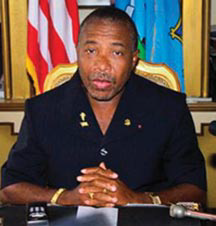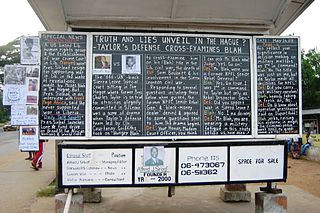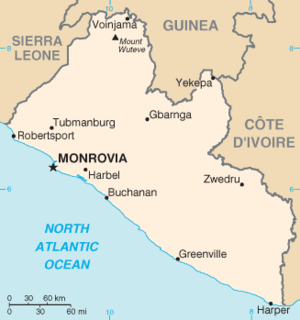Related Research Articles

Liberia, officially the Republic of Liberia, is a country on the West African coast. It is bordered by Sierra Leone to its northwest, Guinea to its north, Ivory Coast to its east, and the Atlantic Ocean to its south and southwest. It has a population of around 5 million and covers an area of 111,369 square kilometers (43,000 sq mi). English is the official language, but over 20 indigenous languages are spoken, reflecting the country's ethnic and cultural diversity. The country's capital and largest city is Monrovia.

Mass media in Liberia include the press, radio, television, fixed and mobile telephones, and the Internet.

Charles McArthur Ghankay Taylor is a former Liberian politician and convicted war criminal who served as the 22nd President of Liberia from 2 August 1997 until his resignation on 11 August 2003, as a result of the Second Liberian Civil War and growing international pressure. Taylor gained a reputation by some Africans as a man of many faces. To his loyal supporters including Liberian humanitarian Cornelius Keagon, he was a preacher who gradually drifted into nationalist politics. To others, he is a rebel leader who later became president in Liberia's first democratic elections.

Monrovia is the capital city of the West African country of Liberia. Founded in 1822, it is located on Cape Mesurado on the Atlantic coast, and is the country's most populous city. As of the 2008 census, with 1,010,970 residents, it was home to 29% of Liberia’s total population. Monrovia is also the country’s economic, financial and cultural center. Its economy is primarily centered on its harbor and its role as the seat of Liberia's government.

Roberts International Airport, informally also known as Robertsfield, is an international airport in the West African nation of Liberia. Located near the town of Harbel in Margibi County, the single runway airport is about 35 miles (56 km) outside of the nation's capital of Monrovia, and as an origin and destination point is referred to as "Monrovia" and locally is often referred to simply as "RIA." The airport is named in honor of Joseph Jenkins Roberts, the first President of Liberia.

The Daily Talk is an English-language news medium published daily on a blackboard on Tubman Boulevard in the center of the Liberian capital Monrovia. According to the New York Times, it is "the most widely read report" in Monrovia, as many Monrovians lack the money or the electricity necessary for access to the conventional mass media. Filmmaker David Lalé has stated that "while the global media too often define Liberia in terms of the tragedy of the recent civil war, from its street-level perspective The Daily Talk describes a busy, hopeful nation in the process of renewal."

Johnnie N. Lewis was a Liberian lawyer and politician who served as the 18th Chief Justice of Liberia from 2006 to 2012. Before his appointment to the Supreme Court, he served as a circuit judge in Liberia's judicial system.
Kenneth Yakpawolo Best is a Liberian journalist who founded the Liberian newspaper The Daily Observer and a paper of the same name in The Gambia.
The Analyst is an independent newspaper published in Liberia, based in Monrovia. Run by two journalists, its aim is to "provide thoughtful, balanced news and encourage civil society in governance and the press". It is considered one of the top sources for political issues in Liberia.
Gregory Artus Frank, also known as Frank Artus, is a Liberian actor, director, and producer in the West African film industries.

The 2013–2016 epidemic of Ebola virus disease, centered in Western Africa, was the most widespread outbreak of the disease in history. It caused major loss of life and socioeconomic disruption in the region, mainly in Guinea, Liberia and Sierra Leone. The first cases were recorded in Guinea in December 2013; later, the disease spread to neighbouring Liberia and Sierra Leone, with minor outbreaks occurring in Nigeria and Mali. Secondary infections of medical workers occurred in the United States and Spain. In addition, isolated cases were recorded in Senegal, the United Kingdom and Italy. The number of cases peaked in October 2014 and then began to decline gradually, following the commitment of substantial international resources.

Cyvette M. Gibson is the tenth Mayor of Paynesville, Liberia. Mayor Gibson has been a community advocate for many years, working over the past 17 years in women's empowerment, legal, and city administration in Liberia and the United States. She was appointed as acting Mayor on November 14, 2012; the youngest mayor in the country. Gibson has focused her administration on improving and empowering communities in Paynesville by providing infrastructure, education, access to employment and entrepreneurship, and basic services such as water, energy, sanitation, housing, health, and safety.
Patrick Oliver Sawyer was a Liberian-American lawyer who was notable for being the index case for the introduction of Ebola virus disease into Nigeria during the West African Ebola epidemic. Sawyer was a naturalized U.S. citizen who lived in Coon Rapids, Minnesota. He has been variously described as working for the Liberian Ministry of Finance and for the mining company ArcelorMittal as their national manager for public health. He was aged 40 at the time of his death.

An epidemic of Ebola virus disease occurred in Liberia from 2014 to 2015, along with the neighbouring countries of Guinea and Sierra Leone. The first cases of virus were reported by late March 2014. The Ebola virus, a biosafety level four pathogen, is an RNA virus discovered in 1976.

This article covers the timeline of the 2014 Ebola virus epidemic in West Africa and its outbreaks elsewhere. Flag icons denote the first announcements of confirmed cases by the respective nation-states, their first deaths, and their first secondary transmissions, as well as relevant sessions and announcements of agencies such as the World Health Organization (WHO), the U.S. Centers for Disease Control (CDC), and NGOs such as Doctors Without Borders; medical evacuations, visa restrictions, border closures, quarantines, court rulings, and possible cases of zoonosis are also included.

The Ebola virus epidemic in West Africa has had a large effect on the culture of most of the West African countries. In most instances, the effect is a rather negative one as it has disrupted many Africans’ traditional norms and practices. For instance, many West African communities rely on traditional healers and witch doctors, who use herbal remedies, massage, chant and witchcraft to cure just about any ailment. Therefore, it is difficult for West Africans to adapt to foreign medical practices. Specifically, West African resistance to Western medicine is prominent in the region, which calls for severe distrust of Western and modern medical personnel and practices.(see Ebola conspiracies below.)
The following is a timeline of the history of the city of Monrovia, Liberia.
A political scandal in Liberia developed in 2014 after the arrest of a group of South Korean businessmen and seizure of US$247,500 from them by the National Security Agency, a national level internal security agency of Liberia.

The Executive Mansion of Liberia is the official residence and workplace of the country's president. Located across the street from the Capitol Building in the Capitol Hill district of Monrovia, the current building was constructed during the presidency of William Tubman, which lasted from 1944 to 1971. The construction started in 1961, and was completed in 1964.
Kriterion Monrovia is a student-run nonprofit organization focused on promoting cinema in Liberia. The group operates the only arthouse cinema in Liberia. Since its founding in 2011, it has screened over 40 films including locally produced art films.
References
- ↑ "Liberian newspapers". Stanford University. Archived from the original on 11 July 2012. Retrieved 28 April 2012.
- 1 2 Epstein, Irving; Limage, Leslie (2008). The Greenwood Encyclopedia of Children's Issues Worldwide. Greenwood Publishing Group. p. 278. ISBN 978-0-313-33616-4 . Retrieved 28 April 2012.
- 1 2 Johnson, Obediah (17 February 2021). "Daily Observer, Liberia's First Independent Daily Celebrates 40th Anniversary; Dedicates Digital Newspaper Archive". FrontPage Africa . Monrovia. Retrieved 6 October 2021.
- ↑ "Columnists – Opinion – Pacific Daily News – guampdn.com". Pacific Daily News. Archived from the original on 28 October 2014. Retrieved 26 January 2015.
- ↑ Jean-Jacques Cornish & Reuters. "Claims of US manufacturing Ebola with HIV go viral". ewn.co.za. Retrieved 26 January 2015.
- ↑ "The major Liberian newspaper churning out Ebola conspiracy after conspiracy". Washington Post. Retrieved 26 January 2015.